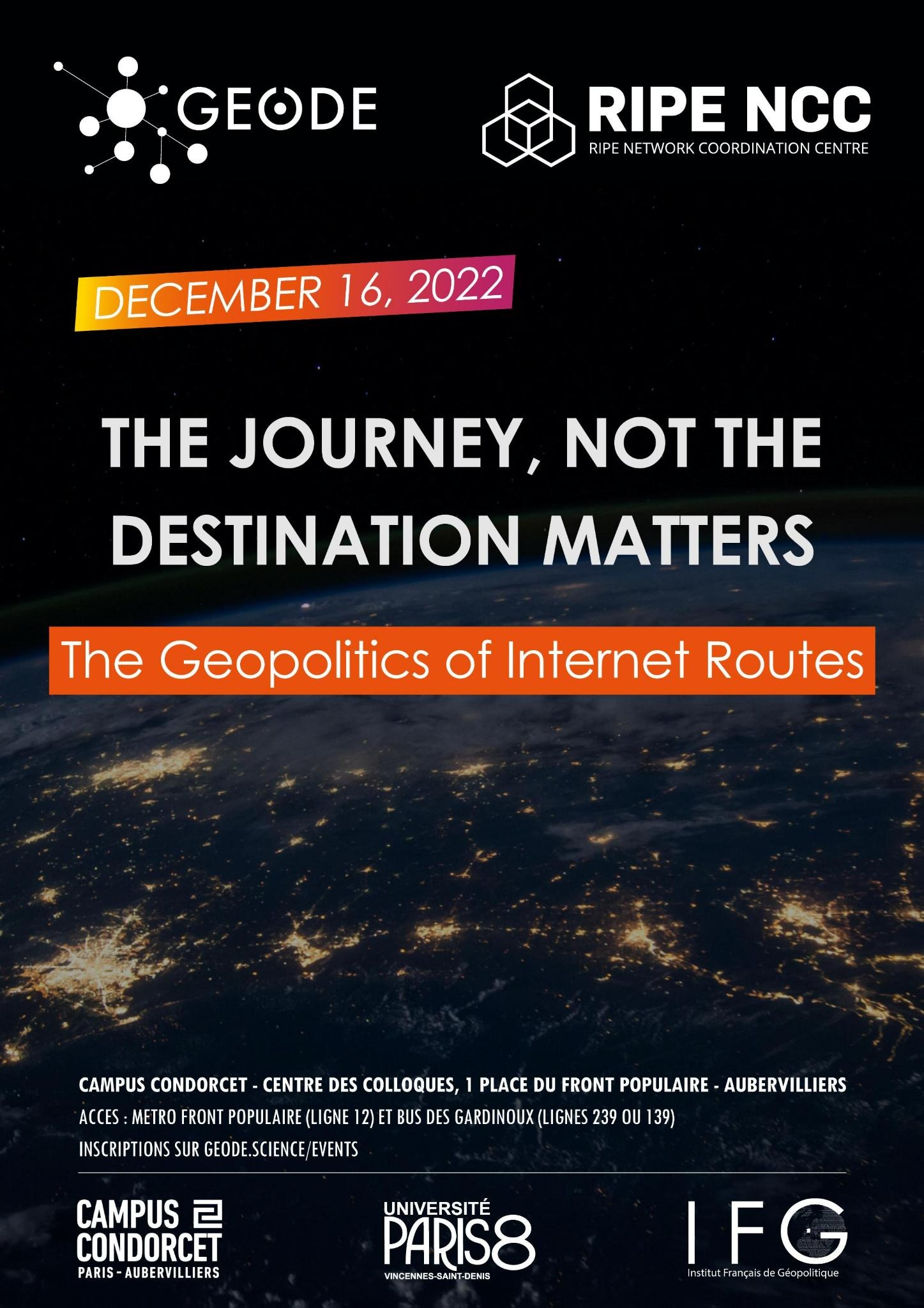
- This event has passed.
Colloque international « The journey, not the destination matters » : The Geopolitics of Internet Routes
16 décembre 2022 @ 9h30 - 18h00

Le colloque se déroulera entièrement en anglais
In the first stage of the War in Ukraine, Russia started meddling with the routes of the Internet in occupied territories. Since April 2022, some local access providers in the Southern region of Ukraine have been switching from their previously Ukrainian transit providers to Russian ones. In March 2022, following the invasion, the London Internet Exchange Point L-INX, an infrastructural node where major worldwide Internet providers interconnect, took the decision to disconnect two significant Russian operators from its infrastructure. At the same time, two major Internet transit providers suggested they would stop operating in Russia, citing European legislations limiting Russian content. Furthermore, at the beginning of the 2022 invasion, the Deputy Prime Minister of Ukraine addressed an unprecedented request to Internet infrastructure governance organizations, asking them to introduce technical sanctions against the Russian Federation in order to cut its roads of access to the global Internet in response to its aggression towards Ukraine. In fact, Russia’s interest in the wartime strategic dimension of Internet routes is not without precedent. Between 2014 and 2021, Russia had managed to reroute all traffic in and out of Crimea towards Russia, while most Internet routes in and out of the Donbass also switched from Ukrainian providers to Russian ones.
All these actions, either by Russia, Ukraine or Western stakeholders, have highlighted the geopolitical importance and highly strategic value of the routes taken by digital data, and of the overall infrastructure of the Internet.
In this very short period of time, driven by a decisively new geostrategic environment, major stakeholders of the Internet infrastructure have shown their will to bend and manipulate the public Internet for geopolitical reasons. However, these examples only illustrate a fundamental principle of the Internet. As a sociotechnical network, it is administered, controlled, and thus shaped by human actors following, among other things, prevailing power relationships and constraints. Conversely, the architecture of Internet infrastructures influences power relationships and equilibria around the world. But routing is a global phenomenon that transcends the political geography that governments have relied upon to assert their authority. The conference thus aims to challenge and question the representations underlying concepts subject to a wide range of interpretations like “digital sovereignty”. States now invoke the matter to assert their authority on data routing and infrastructures. They also attempt to control, divert, or spy on data flows both within and outside of their territories, and sometimes resort to political sanctions that can have an effect on routing and to the free access to the Internet.
The evolution of the Internet’s architecture at the level of routing also raises more overarching stakes, and brings about different perspectives on the future of the Internet. The idea of an open Internet that allows free and global data flows of information has long been dominant in most countries. However, it is increasingly understood as a political representation driven and propagated by major Western stakeholders, which have had a longstanding advantage over markets and infrastructures. The choice of an Internet architecture somewhere between an open model and the so-called state-driven “splinternets” is thus not solely a question of legal and infrastructural conceptions and goals. Defining how the Internet should be structured and organized in a multi-stakeholder governance model is grounded in a broader philosophical tension that questions the definition and fluidity of the concepts of state sovereignty, legitimacy of public and private stakeholders, or human rights.
This conference aims to bring together international researchers in humanities, social sciences and computer science as well as professionals of the Internet infrastructure and governance, in order to better understand the numerous and different ways in which Internet routes and geopolitics intertwine. The conference will look into the past, present and future of the geopolitics of Internet routing, bringing both the global perspective of Internet governance stakeholders and researchers, as well as case studies at both national and regional scales. This conference will offer three panels. The first one aims to bring four different national and transnational case studies that question the relationship between state sovereignty and data routing. The second panel is devoted to the specific case of Ukraine and the major changes in discourses and practices over routing manipulation and their geopolitical significance. The third panel will look into the futures of the Internet, and question the different possibilities of the evolution of the network under the prisms of architecture and governance.
Programme
Welcome coffee (9:00 AM)
Opening words (9:30 AM)
Frédérick Douzet, Director of GEODE
Hisham Ibrahim, RIPE
Introduction (9:40 AM)
Louis Pétiniaud, GEODE
Kevin Limonier, Deputy Director of GEODE
Panel 1 – Routing and sovereignty (10:00 AM – 12:00 AM)
Moderator: Harry Oppenheimer, Harvard University
Rachel Hulvey, University of Pennsylvania
Charlotte Escorne, GEODE
Nowmay Opalinski, GEODE
Célestine Rabouam, GEODE
Panel 2 – Routing and infrastructures in the war in Ukraine (1:30 PM – 3:30 PM)
Moderator: Doug Madory, Kentik
Louis Pétiniaud, GEODE
Ksenia Ermoshina, CNRS
Joanna Kulesza, The University of Lodz
Alex Semenyaka, RIPE NCC
Marie-Gabrielle Bertran, GEODE
Panel 3 – The futures of the Internet (4:00PM – 6:00PM)
Moderator: Kavé Salamatian, European ERA chair in Maritime CyberSecurity TalTech – Tallinn University of Technology
Francesca Musiani, CNRS
Loqman Salamatian, Columbia University
Emile Aben, RIPE NCC
Romain Fontugne, Internet Initiative Japan
Scientific Committee
Frederick Douzet, Kevin Limonier, Louis Pétiniaud
Inscription obligatoire
Details
- Date:
- 16 décembre 2022
- Time:
-
9h30 - 18h00
Organizer
- Geode
- View Organizer Website
Venue
- Centre des Colloques – Campus Condorcet
-
10 Rue des Fillettes
Aubervilliers, 93300 France + Google Map - View Venue Website
